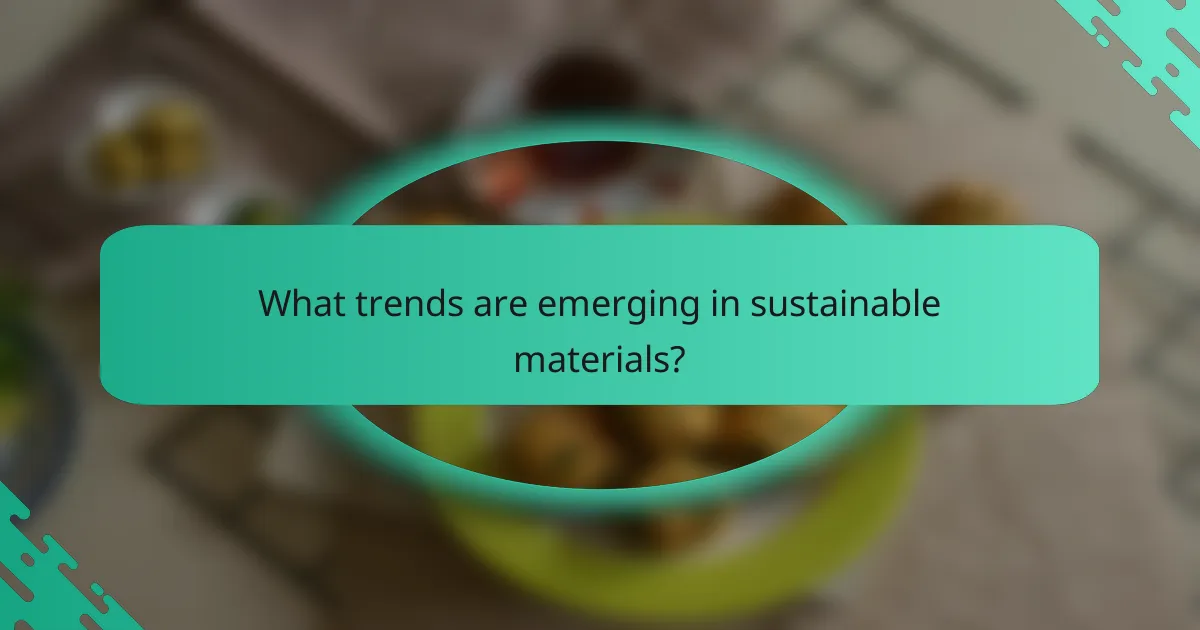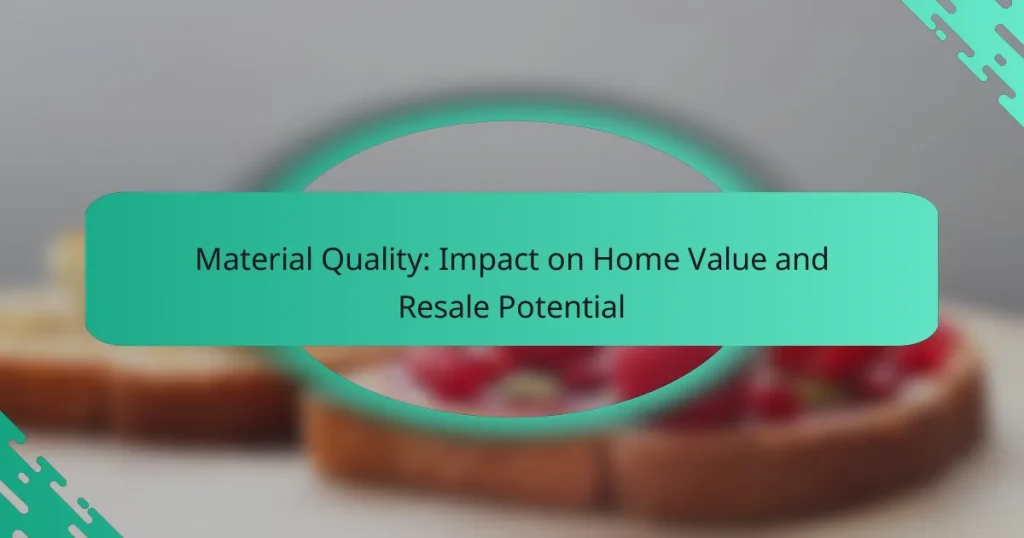Material quality plays a crucial role in determining home value and resale potential, particularly in competitive markets like Los Angeles. Buyers often seek homes with durable and aesthetically pleasing materials, which can lead to higher appraisals and increased interest. By investing in high-quality options such as granite countertops and hardwood flooring, homeowners can enhance both the appeal and marketability of their properties.

How does material quality affect home value in Los Angeles?
Material quality significantly impacts home value in Los Angeles, as buyers often prioritize durability and aesthetics. High-quality materials can lead to higher appraisals and attract more potential buyers, while low-quality options may deter interest and reduce resale potential.
High-quality materials increase property value
Using high-quality materials in home construction or renovation can enhance property value by improving both appearance and longevity. Buyers in Los Angeles are often willing to pay a premium for homes featuring durable materials like hardwood flooring, granite countertops, and energy-efficient windows.
For instance, homes with high-end finishes can see price increases of 10-20% compared to similar properties with standard materials. Investing in quality materials not only elevates the home’s aesthetic appeal but also reduces maintenance costs over time, making it a smart financial decision.
Low-quality materials decrease resale potential
Conversely, low-quality materials can significantly diminish a home’s resale potential. Buyers may perceive homes with inferior finishes, such as cheap laminate or low-grade appliances, as needing immediate upgrades, which can lead to lower offers or extended time on the market.
In Los Angeles, where the real estate market is competitive, homes that require substantial renovations may sell for tens of thousands less than comparable properties with high-quality materials. Avoiding low-quality options is crucial to maintaining a strong market position and achieving a favorable sale price.

What are the best materials for enhancing home resale value?
The best materials for enhancing home resale value include high-quality options like granite countertops and hardwood flooring. These materials not only improve the aesthetic appeal of a home but also contribute to its durability and overall marketability.
Granite countertops
Granite countertops are a popular choice for homeowners looking to increase their property’s value. They are known for their durability, resistance to scratches, and heat tolerance, making them a practical option for kitchens and bathrooms.
When considering granite, it’s essential to choose a color and pattern that complements the overall design of your home. Neutral tones often appeal to a broader range of buyers, while unique patterns can add a distinctive touch.
Installation costs for granite can vary widely, typically ranging from $50 to $150 per square foot, depending on the quality and complexity of the installation. Investing in quality granite can yield a significant return when selling your home.
Hardwood flooring
Hardwood flooring is another material that can significantly boost a home’s resale value. Its timeless appeal and durability make it a favored choice among buyers, often leading to quicker sales and higher offers.
When selecting hardwood, consider the type of wood and finish. Oak and maple are popular choices due to their strength and aesthetic versatility. Additionally, opting for pre-finished hardwood can save time and labor costs during installation.
Installation costs for hardwood flooring generally range from $3 to $12 per square foot, depending on the wood species and installation method. Proper maintenance, such as regular cleaning and refinishing, can help maintain its value over time.

How can homeowners assess material quality?
Homeowners can assess material quality by focusing on durability, aesthetics, and compliance with local building codes. Understanding these factors helps gauge how material quality impacts home value and resale potential.
Inspection by a certified appraiser
A certified appraiser can provide a professional evaluation of material quality during a home inspection. They assess various aspects, including the condition of roofing, siding, and flooring materials, which directly influence property value.
Homeowners should ensure that the appraiser is familiar with local standards and can identify high-quality materials versus subpar options. This inspection may cost a few hundred dollars but can uncover issues that affect resale potential.
Comparative market analysis
A comparative market analysis (CMA) involves evaluating similar properties in the area to determine how material quality affects pricing. This analysis helps homeowners understand how their home stacks up against others with similar features.
When conducting a CMA, focus on homes with comparable materials and finishes. Look for trends in the market, such as whether homes with high-quality materials sell for significantly more than those with lower-quality options. This insight can guide decisions on upgrades or renovations that enhance resale value.

What renovations yield the highest return on investment?
Renovations that yield the highest return on investment typically include kitchen and bathroom upgrades, especially when premium materials are used. These improvements not only enhance the aesthetic appeal of a home but also significantly increase its market value and resale potential.
Kitchen remodels with premium materials
Kitchen remodels using high-quality materials can dramatically boost a home’s value. Features like granite or quartz countertops, custom cabinetry, and high-end appliances are particularly appealing to buyers. Investing in these elements can lead to returns of 70% to 90% of the renovation costs.
When planning a kitchen remodel, consider the overall layout and functionality. Open floor plans are currently in demand, and integrating modern technology, such as smart appliances, can also enhance appeal. Avoid overly personalized designs that may not resonate with potential buyers.
Bathroom upgrades using high-end fixtures
Upgrading bathrooms with luxurious fixtures can significantly impact a home’s resale value. Features such as rainfall showerheads, freestanding tubs, and double vanities are highly sought after. Homeowners can expect returns of around 60% to 80% on these types of renovations.
Focus on quality materials like porcelain tiles and durable plumbing fixtures to ensure longevity and appeal. Additionally, consider energy-efficient options, which can attract environmentally conscious buyers. Keep the design neutral to appeal to a broader audience and avoid trends that may quickly go out of style.

What are the local building codes affecting material choices?
Local building codes significantly influence material choices for construction and renovation projects. These regulations ensure safety, sustainability, and compliance with community standards, impacting both home value and resale potential.
Los Angeles building regulations
In Los Angeles, building regulations are enforced by the Department of Building and Safety (DBS). These codes dictate minimum standards for construction materials, structural integrity, and energy efficiency. Homeowners must adhere to specific guidelines, such as seismic safety measures, which can affect material selection.
For instance, materials used in new constructions must meet stringent fire resistance ratings and energy efficiency standards. This can lead to higher upfront costs but may enhance long-term value and appeal to buyers concerned about safety and sustainability.
Permits for specific materials
Obtaining permits for specific materials in Los Angeles often requires submitting detailed plans to the DBS. Certain materials, like those used for roofing or insulation, may need to meet additional criteria or undergo testing to ensure compliance with local codes.
Homeowners should be aware that using non-compliant materials can result in fines or the need for costly retrofits. It is advisable to consult with a licensed contractor familiar with local regulations to avoid common pitfalls and ensure all materials are approved before starting a project.

How does material quality influence buyer perception?
Material quality significantly impacts buyer perception by shaping their initial impressions and long-term value assessments. High-quality materials often convey durability and luxury, making properties more appealing and potentially increasing resale value.
First impressions from curb appeal
Curb appeal is crucial in real estate, as it forms the first impression for potential buyers. High-quality materials, such as brick or natural stone, can enhance a home’s exterior, making it more inviting and attractive. A well-maintained façade with premium finishes can lead to higher offers and quicker sales.
To maximize curb appeal, focus on using durable materials that withstand weather conditions and require minimal maintenance. Consider features like quality siding, attractive roofing, and well-chosen landscaping to create a lasting impact.
Long-term durability concerns
Durability is a key factor in buyer perception, as it relates directly to maintenance costs and the longevity of a home. Buyers are often wary of properties with materials that may deteriorate quickly, leading to costly repairs. For instance, homes with high-quality roofing materials like slate or metal tend to attract buyers due to their extended lifespan.
When evaluating material quality, consider the long-term implications of your choices. Opt for materials that meet local building codes and standards, ensuring they can withstand environmental challenges. This not only enhances buyer confidence but also supports a higher resale value over time.

What trends are emerging in sustainable materials?
Sustainable materials are increasingly becoming a priority in home construction and renovation, impacting both home value and resale potential. Key trends include the use of recycled content, renewable resources, and eco-friendly manufacturing processes.
Recycled and Upcycled Materials
Recycled and upcycled materials are gaining traction as homeowners seek to reduce waste and environmental impact. These materials can include reclaimed wood, recycled metal, and repurposed bricks, which not only enhance aesthetics but also lower the carbon footprint of a home.
Using recycled materials can lead to cost savings, as they are often less expensive than new materials. However, it is essential to ensure that these materials meet local building codes and quality standards to avoid potential issues during resale.
Renewable Resources
Renewable resources, such as bamboo and cork, are becoming popular choices for flooring, cabinetry, and furniture. These materials are sustainable because they can be replenished relatively quickly compared to traditional hardwoods.
When selecting renewable materials, consider their durability and maintenance requirements. While they may have a higher upfront cost, their longevity can enhance home value over time.
Eco-Friendly Manufacturing Processes
Eco-friendly manufacturing processes are crucial in the production of sustainable materials. Techniques that minimize energy consumption and reduce harmful emissions are increasingly favored by environmentally conscious consumers.
Look for certifications like LEED or Energy Star when choosing materials, as these can indicate a commitment to sustainability. Homes built with such materials often attract buyers willing to pay a premium for energy efficiency and reduced environmental impact.


